 |
"Tôi chẳng
là cái quái gì Fernando
Pessoa "Đám
đông độc giả" có lẽ chỉ biết tới tên nhà thơ Fernando Pessoa, lần đầu
tiên, qua Saramago. Khi được giải Nobel văn chương (1998), ông cho
biết, đây là
tác giả ruột của mình. Nhưng phải đợi tới khi Cao Hành Kiện vinh danh
nhà thơ
người Bồ đào nha, trong bài diễn văn nhận giải Nobel văn chương (2000),
"Lí do của văn học", "nhà thơ thâm trầm nhất của thế kỉ 20 là
Fernando Pessoa", thiên hạ mới tá hỏa! Tá hoả, đúng
như vậy, không chỉ với Đông phương mà luôn cả Tây phương, nhất là cõi
văn viết
bằng tiếng Anh. Eugénio Lisboa, một trong hai người biên tập cuốn
"Fernando Pessoa: A Centenary Edition" (nhà xb Carcanet, Manchester)
ghi nhận: khi Harold Bloom cho xuất bản cuốn "Cõi Văn Tây" (tạm dịch
từ "The Western Canon", 1949), và để Pessoa vào trong danh sách 26
tác giả hàng đầu, một tay điểm sách trên tờ Time, (vì lịch sự, W.S. Mervin, tác
giả bài viết về Pessoa, "Dấu chân của một cái bóng", trên tờ Điểm
Sách New York, số đề ngày 3.12.1998, đã không nêu tên), đã "bực
mình"
cho rằng, vị giáo sư đáng nể này chiều theo sự yếu đuối riêng tư, khi
tự cho
mình có cặp mắt tinh đời, nhận ra được những tác giả hũ nút mang tính
hàn lâm. Hôm nay, tôi sáng suốt, như thể tôi sắp lìa đời" 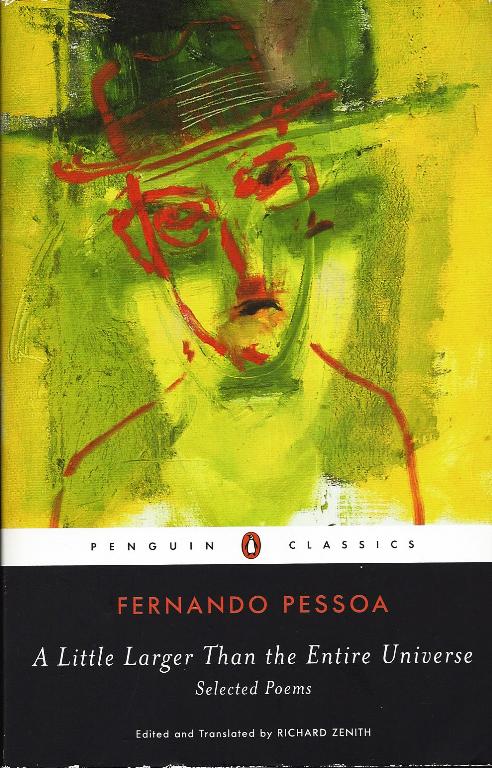 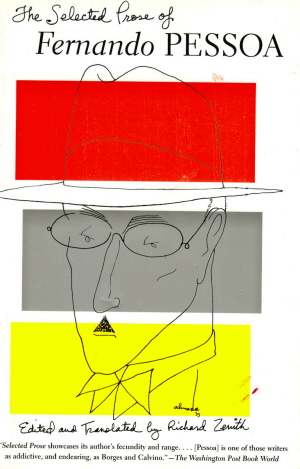 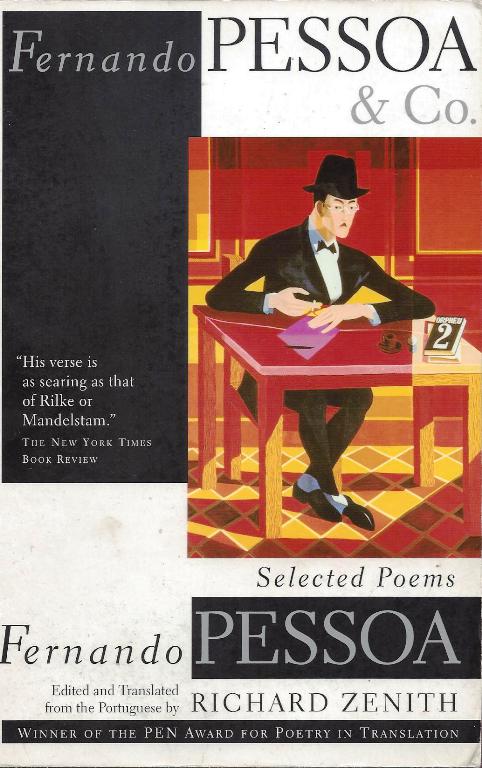 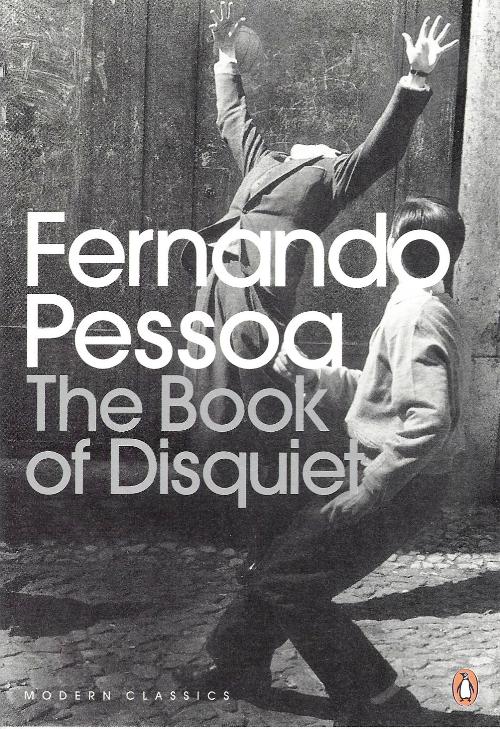 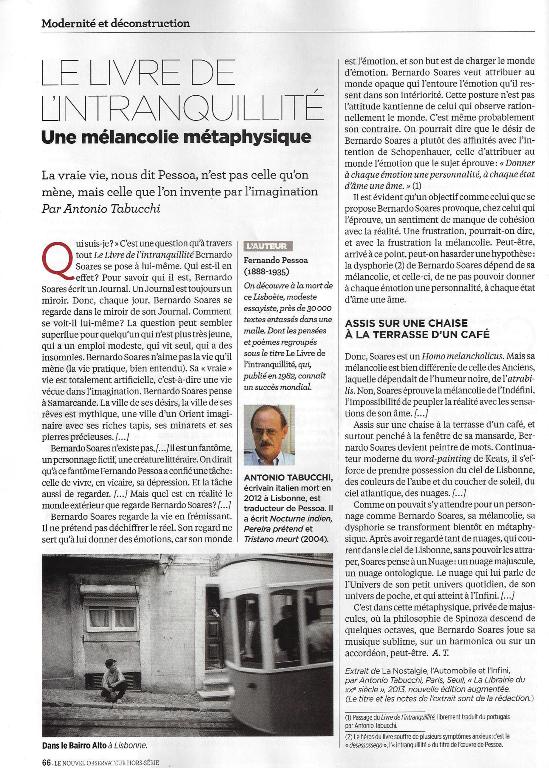 “Cuốn sách của
sự đếch làm sao mà trầm lắng được”: Nỗi buồn siêu hình Đời thực,
Pessoa biểu chúng ta, không phải cuộc đời mỗi đứa còng lưng ra mà cõng,
nhưng
mà là cuộc đời mỗi “Anh Cu Gấu” phịa ra, nhờ tưởng tượng! Il faut savoir voir Lisbonne
pendant le temps exact d'un sanglot. La voir tout entière, par exemple,
dans la première lumière du matin. Ou la voir complètement dans le
dernier reflet du soleil sur la Rua da Prata. Puis pleurer. Parce que,
même si c'est la première fois qu'on la voir, on a l'impression d'y
avoir déjà vécu toutes sortes d'amours tronquées, d'illusions perdues
et de suicides exemplaires. le quartier littéraire de
Lisbonne Ôi chao giá như viết nổi như
dòng như trên đây. Về Sài Gòn Góc văn của
Sài Gòn, như của Lisbonne, là Quán Chùa. Sống ở
Lisbonne như thể nó là một cây diêm lạnh giá, trong khi những căn nhà
của những
con người yêu thương nó run rẩy qua những dòng nước mắt. Fernando
Pessoa's multiple voices have different styles and idioms, and each one
is
extraordinary. George Steiner raves about The Book of Disquiet George
Steiner The
Observer, Sunday 3 June 2001 Was 18 March
1914 the most extraordinary date in modern literature? On that day,
Fernando
Antonio Nogueira Pessoa (1888-1935) took a sheet of paper, went to a
tall chest
of drawers in his room and began to write standing up, as he
customarily did.
'I wrote 30-odd poems in a kind of trance whose nature I cannot define.
It was
the triumphant day of my life, and it would be impossible to experience
such a
one again.' Other poets,
notably Rilke, have experienced such hours of explosive prodigality.
But
Pessoa's case is different and, probably, unique. The first set of
poems was by
one 'Alberto Caeiro' - 'my Master had appeared inside me.' The next six
were
composed by Pessoa struggling against the 'inexistence' of Caeiro. But
Caeiro
had disciples, one of whom, 'Ricardo Reis', contributed further poems.
A fourth
individual 'burst impetuously on the scene. In one fell swoop, at the
typewriter, without hesitation or correction, there appeared the "Ode
Triumphal" by "Alvaro de Campos" - the Ode of that name and the
man with the name he now has.' Pseudonymous
writing is not rare in literature or philosophy (Kierkegaard provides a
celebrated instance). 'Heteronyms', as Pessoa called and defined them,
are
something different and exceedingly strange. For each of his 'voices',
Pessoa
conceived a highly distinctive poetic idiom and technique, a complex
biography,
a context of literary influence and polemics and, most arrestingly of
all,
subtle interrelations and reciprocities of awareness. Octavio Paz
defines
Caeiro as 'everything that Pessoa is not and more'. He is a man magnificently at home in nature, a virtuoso of pre-Christian innocence, almost a Portuguese teacher of Zen. Reis is a stoic Horatian, a pagan believer in fate, a player with classical myths less original than Caeiro, but more representative of modern symbolism. De Campos emerges as a Whitmanesque futurist, a dreamer in drunkenness, the Dionysian singer of what is oceanic and windswept in Lisbon. None of this triad resembles the metaphysical solitude, the sense of being an occultist medium which characterise Pessoa's 'own' intimate verse. Other masks followed, notably one 'Bernardo Soares'. At some complex generative level, Pessoa's genius as a polyglot underlies, is mirrored by, his self-dispersal into diverse and contrasting personae. He spent nine of his childhood years in Durban. His first writings were in English with a South African tincture. He turned to Portuguese only in 1910 (there are significant analogies with Borges). Pessoa
earned his living as a translator. His legacy, enormous and in large
part
unpublished, comports philosophy, literary criticism, linguistic
theory,
writings on politics in Portuguese, English and French. Like Borges,
Beckett or
Nabokov, Pessoa shows up the naive, malignant falsehood still current
in
certain Fenland English faculties whereby only the monoglot and native
speaker
is inward with style and literary insight. The fragmentary, the incomplete is of the essence of Pessoa's spirit. The very kaleidoscope of voices within him, the breadth of his culture, the catholicity of his ironic sympathies - wonderfully echoed in Saramago's great novel about Ricardo Reis - inhibited the monumentalities, the self-satisfaction of completion. Hence the vast torso of Pessoa's Faust on which he laboured much of his life. Hence the fragmentary condition of The Book of Disquiet which contains material that predates 1913 and which Pessoa left open-ended at his death. As Adorno famously said, the finished work is, in our times and climate of anguish, a lie. It was to
Bernardo Soares that Pessoa ascribed his Book of Disquiet, first made
available
in English in a briefer version by Richard Zenith in 1991. The
translation is
at once penetrating and delicately observant of Pessoa's astute
melancholy.
What is this Livro do Desassossego ? Neither 'commonplace book', nor
'sketchbook', nor 'florilegium' will do. Imagine a fusion of
Coleridge's
notebooks and marginalia, of Valery's philosophic diary and of Robert
Musil's
voluminous journal. Yet even such a hybrid does not correspond to the
singularity of Pessoa's chronicle. Nor do we know what parts thereof,
if any,
he ever intended for publication in some revised format. What we have
is a haunting mosaic of dreams, psychological notations,
autobiographical
vignettes, shards of literary theory and criticism and maxims. 'A
Letter not to
Post', an 'Aesthetics of Indifference', 'A Factless Autobiography' and
manual
of welcomed failure (only a writer wholly innocent of success and
public
acclaim invites serious examination). If there is
a common thread, it is that of unsparing introspection. Over and over,
Pessoa
asks of himself and of the living mirrors which he has created, 'Who am
I?',
'What makes me write?', 'To whom shall I turn?' The metaphysical
sharpness, the
wealth of self-scrutiny are, in modern literature, matched only by
Valery or
Musil or, in a register often uncannily similar, by Wittgenstein.
'Solitude
devastates me; company oppresses me. The presence of another person
derails my
thoughts; I dream of the other's presence with a strange
absent-mindedness that
no amount of my analytical scrutiny can define.' This very scrutiny,
moreover,
is fraught with danger: 'To understand, I destroyed myself. To
understand is to
forget about loving.' These findings arise out of a uniquely spectral
yet
memorable landscape: 'A firefly flashes forward at regular intervals.
Around me
the dark countryside is a huge lack of sound that almost smells
pleasant.' Throughout,
Pessoa is aware of the price he pays for his heteronomity. 'To create,
I've
destroyed myself... I'm the empty stage where various actors act out
various
plays.' He compares his soul to 'a secret orchestra' (shades of
Baudelaire)
whose instruments strum and bang inside him: 'I only know myself as the
symphony.' At moments, suicidal despair, a 'self-nihilism', are close.
'Anything, even tedium', a finely ironising reservation, rather than
'this
bluish, forlorn indefiniteness of everything!' Is there any city which
cultivates
sadness more lovingly than does Lisbon? Even the stars only 'feign
light'. Yet there are also epiphanies and passages of deep humour. In the 'forests of estrangements', Pessoa comes upon resplendent Oriental cities. Women are a chosen source of dreams but 'Don't ever touch them'. There are snapshots of clerical routine, of the vacant business of bureaucracy worthy of Melville's Bartleby. The sense of the comedy of the inanimate is acute: 'Over the pyjamas of my abandoned sleep...' The juxtapositions have a startling resonance: 'I'm suffering from a headache and the universe.' A sort of critical, self-mocking surrealism surfaces: 'To have touched the feet of Christ is no excuse for mistakes in punctuation.' Or that fragment of a sentence which may come close to encapsulating Pessoa's unique reckoning: '... intelligence, an errant fiction of the surface'. This is not
a book to be read quickly or, necessarily, in sequence. Wherever you
dip, there
are 'rich hours' and teasing depths. But it will, indeed, be a banner
year if
any writer, translator or publisher brings to the reader a more
generous gift. 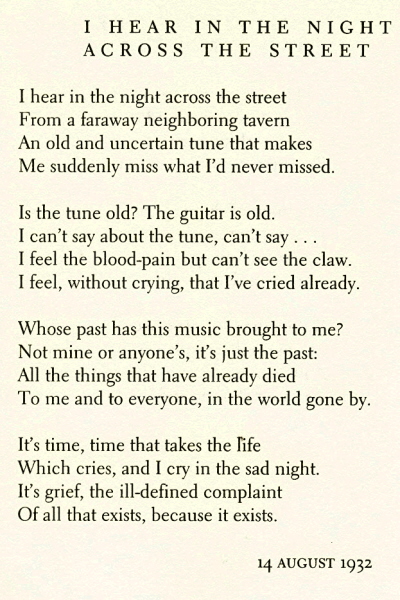 Fernando Pessoa Note: Bài thơ trên TV đã
dịch, nhưng không làm sao kiếm ra. Đành dịch một lần nữa vậy, vì bất
ngờ, GCC nhớ ra cái điệu nhạc trên là của một bài nhạc sến. Gấu nghe trong đêm,
chạy dài theo con phố Gấu
nghe trong đêm, Điệu
nhạc xưa? Cái đàn ghi ta cũ. Quá
khứ nào điệu nhạc mang lại cho Gấu? Tới giờ rồi. Giờ nghỉ chơi
với cuộc đời
Nó khóc, và Gấu khóc, trong đêm buồn Đó là nỗi sầu đau, là lời thở than mập mờ, không làm sao định nghĩa được Về mọi điều hiện hữu, bởi vì nó hiện hữu (1) (1) Khổ thơ chót, GCC dịch
trật: Chính là thời gian, cái
thời gian đã lấy đi đời sống, (Nói một cách hơi cải
lương rằng thì là - nhưng không bảo đảm đúng- : Tks. Many Tks Đời sống đã mất, nỗi đau
vẫn còn. Đúng như thế.
|